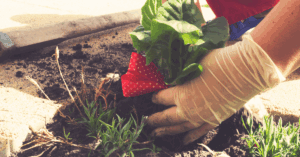Gardening therapy cuts dementia risk by 36%, making it a vital activity at senior living communities. The benefits go beyond creating beautiful landscapes; residents get a detailed wellness approach that strengthens their body and mind.
Therapeutic gardening brings remarkable physical improvements. Seniors build flexibility, strength and stamina while lowering their risk of type 2 diabetes, osteoporosis and heart disease. The residents who join gardening programs sleep better, feel less stressed and stay more focused. These activities give residents a strong sense of purpose and achievement. The social connections they make while gardening help curb loneliness and isolation.
How Therapeutic Gardening Supports the Senses and the Soul
Gardens offer profound healing benefits for seniors by engaging all five senses simultaneously. Research confirms that connecting with nature improves psychological well-being, reduces stress and enhances focus.
Touching different plant textures lowers blood pressure, while familiar garden scents reach the limbic system through the olfactory nerve, triggering powerful memories and providing comfort for those with cognitive challenges.
These multisensory experiences create an environment where nature’s gentle appeal naturally captures attention, helping minds recover from fatigue. Studies show that viewing natural greenery produces healthier brain wave patterns compared to artificial surroundings, while plant aromas reduce stress responses and enhance cognitive function. Therapeutic gardens provide seniors with meaningful connections to nature that heal both physically and emotionally, which is especially beneficial for those facing attention deficits from various conditions.
Practical Ways We Bring Gardening Therapy to Life
Through wise design choices and fresh ideas, senior living communities in Brookfield, WI, have turned therapeutic gardening into everyday activities. We made garden spaces available to everyone by installing raised beds 24-36 inches high, perfect for residents who garden while seated or use mobility devices.
The garden spaces welcome all residents thanks to these essential features:
- Smooth, wide pathways measuring at least 4 feet across to accommodate wheelchairs and walkers, with firm surfaces that prevent tripping hazards
- Ergonomic gardening tools with cushioned grips and extended handles that reduce strain on hands, wrists and backs
- Strategically placed seating areas throughout the garden to provide rest spots and encourage social interaction
The garden offers different spaces for everyone’s comfort level—group areas for social activities, quiet corners for peaceful moments and observation spots for those who prefer to enjoy the garden atmosphere without hands-on participation.
Emotional and Cognitive Benefits for Residents
A senior living community in Brookfield, WI, believes gardening therapy is the lifeblood of their communities. Gardening offers remarkable brain benefits for seniors, with studies showing regular gardeners have a 36% lower risk of dementia.
This protective effect comes from the mental stimulation of planning layouts, remembering planting schedules and learning about different plants. Research demonstrates that just 20 minutes of gardening significantly increases brain nerve growth factors like BDNF and PDGF, which promote neuronal development and survival as we age.
Beyond cognitive advantages, gardening provides profound emotional benefits.
The sensory experiences of touching plants or smelling flowers can generate precious memories, creating meaningful connections to the past.
Nurturing plants gives seniors a sense of achievement as they witness their positive impact on living things. Studies validate that gardening’s unique mix of light physical activity, social interaction and nature connection reduces depression and anxiety symptoms, enhancing overall emotional well-being.
The Garden’s Gift
Therapeutic gardening offers powerful wellness benefits for seniors. It combines gentle physical exercise with significant cognitive support—research shows it can reduce dementia risk by 36% while promoting neural growth. The multisensory experience of touching the soil and smelling fragrant plants creates meaningful connections that enhance emotional well-being and brain function, regardless of physical abilities.
This holistic activity uniquely blends movement, mental stimulation and social engagement in one meaningful practice. Adaptable setups with raised beds and ergonomic tools ensure inclusive participation, while community planting fosters relationships that combat isolation. Nurturing plants gives seniors purpose and achievement, creating profound sensory gardening benefits that enhance the quality of life in assisted living environments.
At Heritage Elm Grove, we believe in fostering a vibrant and supportive community where every individual can thrive. Our unique approach enhances well-being and creates a fulfilling environment for all our residents. We offer a variety of programs and amenities that promote engagement, personal growth and a strong sense of belonging. Discover how our dedicated team and enriching activities contribute to a brighter, more active lifestyle for those in our care.
We invite you to experience Heritage Elm Grove’s positive impact. Call us at (262) 786-5800 to schedule your visit and see how we’re dedicated to brightening lives in our community.
FAQs
Q1. How does gardening benefit mental health?
Gardening can improve mental health by lowering stress, anxiety and depression. The action of nurturing plants and watching them grow can provide a sense of accomplishment.
Q2. Can gardening help with physical health as well?
Yes, gardening is an excellent form of physical exercise. It can improve flexibility, strength and stamina, minimizing the risk of conditions like diabetes, osteoporosis and heart disease. Additionally, spending time outdoors in the garden increases exposure to vitamin D from sunlight, which is essential for health.
Q3. How can seniors benefit from gardening therapy?
Gardening therapy can greatly benefit seniors. It provides gentle exercise, boosts cognitive function and reduces the risk of dementia. Gardening also offers sensory stimulation, promotes social interaction and can give seniors a renewed sense of purpose and accomplishment in their daily lives.


